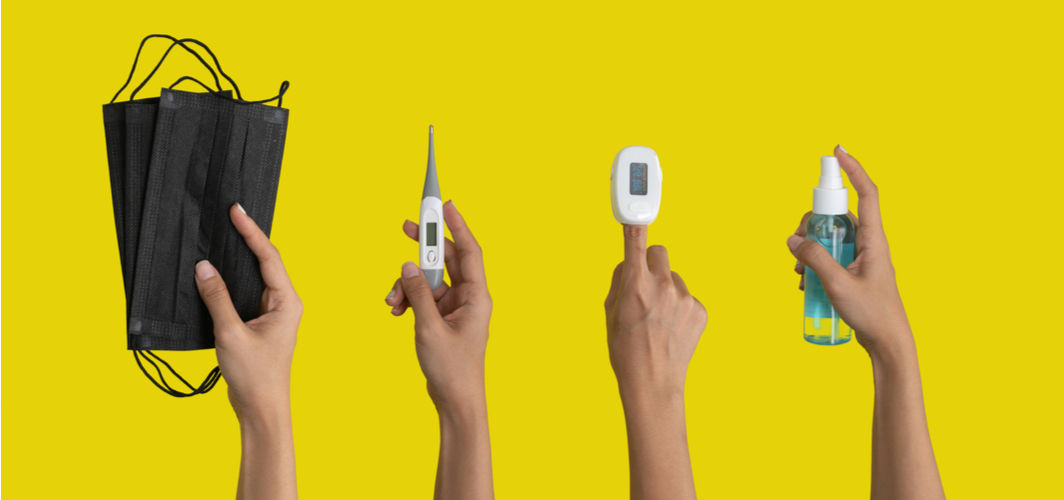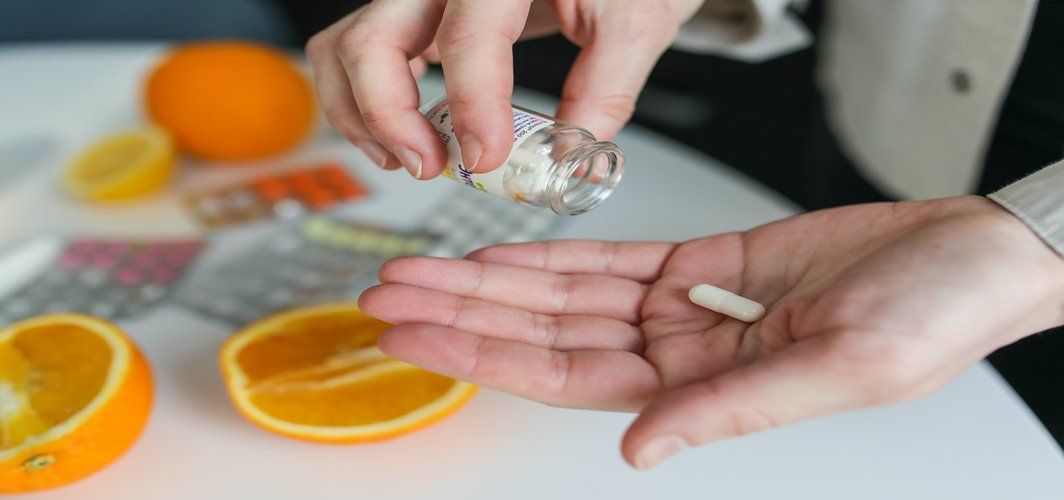The COVID-19 outbreak has undeniably disrupted our normal lives. After a brief period of lockdown across the country, restrictions are gradually being lifted. While we look forward to some semblance of normalcy again, keeping safe and taking necessary precautions remain the top priority. Besides practicing social distancing, wearing masks, washing hands frequently, and staying indoors as much as you can, keeping a ‘Coronavirus home kit’ at your house is advisable. The kit can come in handy if you:
- Have mild COVID-19 symptoms or have been tested positive, but do not need hospital treatment
- Stay with someone who has developed COVID-19 symptoms or has been tested positive
- Live with elderly and family members with any underlying health conditions (like hypertension, diabetes, cardiovascular disease, respiratory condition, renal disease, etc.).
Here are some of the recommended items that could be included in the Coronavirus home kit:
1. Pulse Oximeter
One of the major symptoms of the Coronavirus is the shortness of breath caused due to low levels of oxygen in the body. You may have difficulty in self-assessing the respiratory distress caused by silent depletion of oxygen saturation levels (SpO2) in your body. A pulse oximeter is a handy portable device that detects oxygen saturation levels in both asymptomatic and symptomatic COVID-19 patients. The normal range of oximeter readings varies from 95 to 100 percent. If your oxygen saturation level is below 90 percent, you should consult a doctor immediately. Make sure you rub the oximeter with an alcohol swab after each use. 2. Steam Inhaler
While steam inhalation may not cure viral and flu infections like the Coronavirus, it can help manage some symptoms of the virus-like nasal congestion, and ease breathing difficulties due to nasal blockage. Steam Inhaler therapy includes inhaling warm water vapors, which may soothe the blockages of the nasal channels, throat, and lungs. Steam inhalation can also help in reducing inflammation and pain of the sinuses. Trying steam therapy two or three times each day will help you considerably to manage symptoms of cold or Coronavirus. You may also add essential oils like peppermint, tea tree, eucalyptus, or neem oil for added benefits. 3. Blood pressure monitor
Maintaining healthy blood pressure levels (somewhere between 90/60mmHg and 120/80mmHg) is essential during the Coronavirus pandemic and even after that.
Based on studies by Centers for Disease Control and Prevention (CDC), people above 65 or older and individuals of any age group with other health conditions like hypertension or high blood pressure are at high risk of experiencing severe COVID-19 symptoms. Hence, it is important to remain protected and manage your blood pressure effectively at home. 4. Glucometer
High blood sugar levels can make it difficult for you to recover from some fatal viral infections like COVID-19, as the immune system slows down in diabetic patients. Hence, it is crucial to manage your blood sugar levels without letting them become very high or too low. A glucometer is an essential device that every person with diabetes should keep in their home. The frequency of the blood sugar levels measurement can vary from person to person and should be taken as recommended by the doctor. Remember to clean your glucometer after each use and protect it from moisture. 5. An easy-to-use digital thermometer
A thermometer is an essential item to have in a medical kit. And during these times of the pandemic, it’s even more crucial to do regular temperature checks if you are feeling unwell. Since fever is one of the symptoms of COVID-19, recording your temperature twice a day will help you keep track of your health. To ensure the accuracy of the readings, avoid having anything too hot or cold before measuring your body temperature. Always remember to wash your thermometer with cold water, rub with alcohol and then rinse before each use. 6. Telemedicine Mobile App
With telemedicine apps, you can now stay connected with your doctor remotely and get instant consultations when required. You may even buy your medicines from online pharmacies and get assistance to manage COVID-19 and other underlying illnesses. One of the many popular telehealth apps is Apollo 24/7 which connects you to doctors from over 70 specialities while also letting you book tests and order medicines. In case you don’t have access to a smartphone, keep the phone numbers of your doctors and specialists on your speed dial list to contact them during a health emergency.
7. Over-the-counter medicines and dietary supplements
During these difficult times, it is important to stock up on a few important non-prescription drugs along with dietary supplements in your medical kit so you are prepared to fight minor health issues. While none of the over-the-counter (OTC) medicines and nutritional supplements is going to treat the Coronavirus, you might get relief from small ailments that don’t require a visit to the doctor. Besides, nutritional supplements can help in strengthening your immune system to fight Coronavirus. Keep in mind that while these medications and supplements provide comfort for a short duration, you should book an appointment with your doctor if your condition worsens. Here are some OTC medicines and health supplements that you should keep handy:
- Acetaminophen/Ibuprofen/Aspirin - for muscle aches, headaches, backaches, and fever
- Decongestant/Dextromethorphan/Antihistamine - for common cold
- Hydrocortisone cream/Calamine lotion/Antihistamine cream - for skin rashes and itching
- Calcium carbonate tablets/Bismuth subsalicylate - for stomach and digestive issues
- BETADINE gargle and mouthwash - for sore throat relief
- Vitamin C - for keeping your immune system healthy
- Vitamin D - for decreasing inflammation and boosting immune response
- Zinc - for a healthy immune system, and relief from the common cold
Please read the labels of these medicines carefully to know about their side effects, dosage, and frequency. Also, consult your doctor before starting on any of these.
8. Hand Sanitizer
Handwashing and hand sanitizing are considered to be simple yet effective ways to prevent the spread of pathogens, including viral and bacterial infections. The CDC recommends that you rub your hands frequently before touching your face, eyes, nose, and mouth. In case you are not able to wash your hands due to no access to running water or soap, make sure you rub your hands with sanitizers with at least 60% alcohol content. Buy a few bottles of sanitizers and keep them at various places in your home like your kitchen countertop (away from the gas stove), restroom, work desk, dining table, and living room. 9. Disinfecting wipes
According to the CDC, disinfecting frequently touched surfaces on a regular basis is essential to curb the spread of COVID-19. While a disinfecting wipe is quite convenient to handle, it might not be the most economical option for cleaning every part of your home, since it is not easy to disinfect larger areas. Disinfecting wipes are the most preferred option for disinfecting small sections of your home like doorknobs, toilet seats, cabinets, appliances, cellphones, and small decorative items in your living and bedroom. Try cleaning surfaces at least twice daily. If you have someone in your home who is sick, ensure that the surface touched by the infected person is cleaned immediately. Although the WHO recommends wearing medical-grade face masks only if you work directly with patients infected with the COVID-19 or take care of anyone who has this virus, you can wear reusable fabric handmade face masks. For these masks, the CDC recommends two layers of tightly woven hundred percent cotton cloth, such as quilter’s material or bedsheets with a high thread count. These are economical and eco-friendly, and you can reuse them after giving them a 60°C wash to kill the COVID-19 virus. What to do if you or a family member is recommended home isolation
If you or a family member is advised home isolation by a doctor, strict home isolation protocols should be followed. Apart from having such a kit ready, follow these steps to ensure zero transmission of the virus:
- Isolate yourself in a separate and well-ventilated room with a personal bathroom
- Keep your utensils for food and water separate from the rest of the family members. Wash it yourself after eating and store it inside your room
- Dispose your used gloves, masks, and other waste inside a bin with a closed lid before giving it to the local municipal authority
- Do not share your personal belongings and toiletries with anyone
- Wash your bed linen and clothes using regular laundry soap or carry out machine wash at 60–90 °C.
Conclusion
With the rising numbers of Coronavirus positive cases, doctors are likely to continue recommending home isolation for people who are asymptomatic but positive or those with mild symptoms. This is an important step towards lowering the stress on our healthcare system. Equally, it is important that we are fully prepared for such scenarios well in advance. Keeping a simple Coronavirus home kit will go a long way in keeping you and your family members safe and healthy.
Buy Coronavirus Protection Kit







